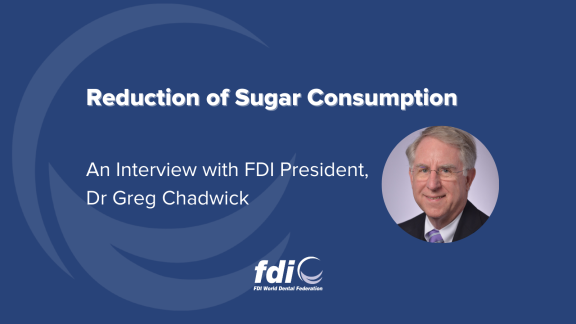Interview with FDI President, Dr Greg Chadwick, on reduction of sugar consumption
In this interview, FDI President Dr Chadwick, shares insights about the implementation strategy of the FDI Position on Free Sugars. Read now.

How will the FDI's Position on Free Sugars, a key focus during your presidency, translate into real-world goals for cutting sugar consumption? What outcomes are you aiming for in this critical mission?
First, I would like to say how pleased we are with the adoption of the FDI Position on Free Sugars by the General Assembly at the 2023 World Dental Congress in Sydney. This endorsement is very timely and will enable us to ramp up our efforts to begin to address the pressing issue of the consumption of free sugars. To describe the FDI Position with reasonable goals to reduce sugar consumption, we are currently developing a strategy which will help us understand the areas where we are best placed to address sugar consumption. We are also mapping relevant successful sugar advocacy efforts led by our members and other stakeholders to build the evidence for effective advocacy efforts. We will equip National Dental Associations and other oral health advocates with the tools and knowledge to push governments to develop and implement ambitious sugar reduction policies with measurable targets. The main outcomes that we expect from this strategy are capacity building, sharing knowledge and best practices, influencing policies, and driving action to tackle excessive sugar consumption.
We encourage everyone to take an interest in this very significant health-impacting topic and to learn about the adverse effects of excessive sugar consumption not only on oral health, but also overall health. Together, we can make a change that achieves a healthier world.
Is there a solid political commitment driving the reduction in sugar consumption, and how are FDI members actively translating this commitment into action?
There is indeed already a political commitment to address this issue as outlined in the WHO Global Oral Health Action Plan (2023-2030), specifically Global Target 2.1. This target recommends that “By 2030, 50% of countries should implement policy measures aiming to reduce free sugars intake,” signifying a global push towards this critical goal.
In WHO’s compendium of “best buys” and recommended interventions for the prevention and control of noncommunicable diseases (also known as Appendix 3 of the Global NCD Action Plan), implementing a tax on sugar-sweetened beverages (SSBs) is also proposed as a policy option to support a reduction in the intake of free sugars as part of a comprehensive approach to addressing the prevention of obesity and dental caries.
Evidently, numerous countries have already taken substantive action. Following a capacity building workshop co-hosted by FDI and the Indian Dental Association in 2022, India now observes a national 'No Sugar Day' on November 1st. The United States government recently conducted webinars addressing strategies to diminish added sugars consumption. Various Latin American nations have formulated policies taxing sugar-sweetened beverages (SSBs), while Norway has implemented a ban on marketing unhealthy foods and drinks to individuals under 18. Additionally, Jamaica has introduced guidelines restricting the sale of SSBs in schools and public health facilities.
So, we are definitely seeing an increase in political commitment to address this global challenge. Addressing sugar intake at a policy level will not only enhance oral health but also contribute significantly to the overall well-being of populations worldwide.
What would be the benefits of reducing sugar intake for countries' policies on oral health and noncommunicable diseases?
Sugar is a common risk factor for many noncommunicable diseases, including cardiovascular disease, diabetes, obesity and dental caries. By reducing sugar intake, there's a direct positive impact on prevention of these diseases as well as oral health. Implementing policies that advocate for lower sugar consumption can significantly contribute to long-term health improvements and reduced health spending on preventable illnesses.
Collaboration among health organizations and professionals is crucial. A unified front amplifies our collective voice, enabling us to drive impactful changes. Together, through collaboration and a shared vision, we can effect positive transformation in public health and promote healthier lifestyles globally.
What are FDI's plans to implement its Position on Free Sugars?
Our upcoming strategy on sugar will increase FDI’s advocacy efforts to raise awareness of the major problem of excessive sugar consumption. Moreover, we will continue to engage with global stakeholders such as the World Health Organization. FDI's commitment extends to empowering its members. The organization will implement robust capacity-building initiatives, equipping its members with the necessary tools, knowledge, and resources to address sugar consumption effectively.

